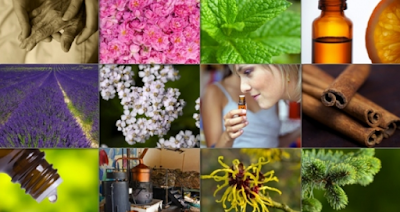Aromatherapy has become a catchall term used to describe the scents used in soaps, lotions, shampoos and conditioners, and the effect of certain scents on the mind and body. In strict practice, though, aromatherapy is the use of volatile oils derived from plants to affect the mood or health. In clinical aromatherapy, the volatile oils used have specific effects on the body, including antiseptic and anti-inflammatory. While aromatherapy is regarded as a complementary medical tool in the United States, more of a 'touchy feely', New Age discipline with little evidence, the role of essential oils and aromatherapy are taken more seriously in Europe. In France, for instance, many essential oils are available only by prescription and aromatherapy is a part of conventional medicine.
Theory
While most people believe that aromatherapy is all about what your nose senses, there is far more to it than just scent. Essential oils are extracts from plants, many of which do have pharmacologic effects on the body and mind. In aromatherapy, these oils are used in various ways to induce the desired effect. The oils have a specific chemical action when inhaled, applied to the skin or ingested.
Practice
Aromatherapy is gaining wider acceptance in medical circles as research finds that scents and essential oils do have some medical and pharmacological effects on the body. The most accepted uses of aromatherapy are for the relief of pain and nausea, often post-operative or in conjunction with chemotherapy. There are various methods of using the essential oils. They include:
inhalation, the most common method of delivering essential oils, is either by diffusing the oil in the air, or by direct inhalation through inhalers.
Absorption through the skin in baths, massages and compresses
Absorption through the mucus membranes
Ingestion - rarely used, and only with medical supervison
The therapeutic effects of essential oils are based on the chemical composition of the oil. It is not enough for something to 'smell like lavender' - lavender oil has a specific chemical makeup that is thought to act on chemical receptors in the brain. Among the therapeutic effects are:
antiseptic effects: many essential oils are antiviral, antifungal and antibacterial
anesthetic effects: some essential oils like menthol or camphor temporarily dampen pain receptors. Oil of camphor, for instance, is widely used to relieve the pain of toothaches.
Effects on the central nervous system that may induce relaxation or other psychological effects
Evidence For
There exist very few controlled studies to prove the effectiveness or safety of aromatherapy, but some uses of aromatherapy are simply accepted. These include the use of eucalyptus and menthol for treating congestion and upper respiratory infections, and the use of lavender for pain relief and relaxation.
Criticism
Critics point out that there is little formal research to demonstrate the efficacy of aromatherapy, and that it is almost impossible to standardize the chemical makeup of essential oils in order to accurately and adequately test their effects.
Despite the criticisms and the view of aromatherapy as a harmless but useless discipline, aromatherapy is one of the fastest growing branches of alternative medicine.
Theory
While most people believe that aromatherapy is all about what your nose senses, there is far more to it than just scent. Essential oils are extracts from plants, many of which do have pharmacologic effects on the body and mind. In aromatherapy, these oils are used in various ways to induce the desired effect. The oils have a specific chemical action when inhaled, applied to the skin or ingested.
Practice
Aromatherapy is gaining wider acceptance in medical circles as research finds that scents and essential oils do have some medical and pharmacological effects on the body. The most accepted uses of aromatherapy are for the relief of pain and nausea, often post-operative or in conjunction with chemotherapy. There are various methods of using the essential oils. They include:
inhalation, the most common method of delivering essential oils, is either by diffusing the oil in the air, or by direct inhalation through inhalers.
Absorption through the skin in baths, massages and compresses
Absorption through the mucus membranes
Ingestion - rarely used, and only with medical supervison
The therapeutic effects of essential oils are based on the chemical composition of the oil. It is not enough for something to 'smell like lavender' - lavender oil has a specific chemical makeup that is thought to act on chemical receptors in the brain. Among the therapeutic effects are:
antiseptic effects: many essential oils are antiviral, antifungal and antibacterial
anesthetic effects: some essential oils like menthol or camphor temporarily dampen pain receptors. Oil of camphor, for instance, is widely used to relieve the pain of toothaches.
Effects on the central nervous system that may induce relaxation or other psychological effects
Evidence For
There exist very few controlled studies to prove the effectiveness or safety of aromatherapy, but some uses of aromatherapy are simply accepted. These include the use of eucalyptus and menthol for treating congestion and upper respiratory infections, and the use of lavender for pain relief and relaxation.
Criticism
Critics point out that there is little formal research to demonstrate the efficacy of aromatherapy, and that it is almost impossible to standardize the chemical makeup of essential oils in order to accurately and adequately test their effects.
Despite the criticisms and the view of aromatherapy as a harmless but useless discipline, aromatherapy is one of the fastest growing branches of alternative medicine.

No comments:
Post a Comment